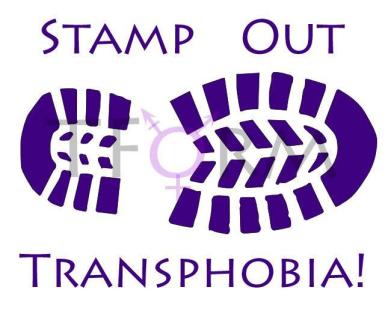
Are you a cis ally? Or do you know a cis that wants to be an ally? I think we all have at least one cis person in our life that could utilize this information. Transgender people are outnumbered by cis people in today’s society and cisgendered people should be aware that we are the minority. Trans people are easily degraded and put down by people who are ignorant and don’t understand anything about what being transgender is all about. Cis allies are important to combat that kind of behavior and to have another voice in the community fighting for our rights just as much as your own. Truthfully unless you’re a white cis male you were a minority at some point or still are.
Which brings me to my point. Just because you call yourself an “ally” does not make you one. Unfortunately, there are innumerable ways to be a bad one. This is even true of people at large LGBT organizations and in the LGBT spectrum who really should know better. Instead we see the same mistakes being made over and over again. Even more pervasive are people who they they’re open-minded and tolerant but, in truth, hold views that keep transgender people firmly in second class citizen status. I can’t tell you how many times I have heard or seen the following:
- “You can do whatever you want to your body; I just don’t want to pay for it.”
- “I have nothing against transgender people, but I think businesses should be able to hire or fire whoever they want.”
- “I don’t think people should use a different bathroom until they have had the surgery.”
- “You should only be able to get a new ID if you’ve had the surgery.”
- “Businesses should be able to serve whoever they want. You have to respect the owners’ religious beliefs.”
- “I don’t want my children having to deal with issues like transgender teachers.”
- “I was in favor of repealing ‘don’t ask, don’t tell,’ but I don’t think transgender people should be in the military because [fill in the blank].”
- “I have nothing against transgender people, but I could never date one.”
- “Transgender women shouldn’t play against real women. They should just have their own league.”
- “Schools aren’t equipped to handle transgender issues. Why don’t they just have separate schools for those children?”
- “You may be a woman, but you’re not the right type of woman.” (Hat tip to Lisa Vogel.)
- “I don’t believe that really happened to you when you transitioned.”
- “I don’t care how my actions affect you.”
After all these bad examples, however the question remains: What makes a good ally? In all the examples above, people take these positions based on a lack of understanding of the lived experiences of so many transgender people; of how hard it is to find work, or medically necessary health care, or accepting partners, or athletic activities where we’re welcomes, or safe spaces; how hard it is to simply not be othered.
The starting point to being a great ally is listening and not just listening but hearing what we are saying. Here is a list of 5 ways to be a good ally.
1) Don’t assume.
Don’t assume anything. Don’t assume that because someone passes as a certain gender, that you shouldn’t ask what their preferred pronouns are. Don’t assume that just because trans* women are more frequently victimized that they also aren’t creating art, contributing to their communities or seizing political positions as well. Don’t assume that feminist services, like women’s shelters, will be safe places for trans* women. Don’t assume that you know anything about their experiences, their lives, their sexuality or politics. Don’t assume that because someone came out to you as trans*, that you can now out them at every chance by adding that they are your “transgender friend.”
All gender issues involve all people of all genders. Don’t assume that a feminist issue only affects cisgender women or that misogyny doesn’t affect trans* men because of their past experiences with gender. Don’t assume that trans* people even want to be male or female and not somewhere on a gender spectrum or that medical transitions, which are often inaccessible to poor trans folks, are the only ways to “legitimately” transition.
Check and double-check that spaces have access to gender neutral bathrooms and that your organizing includes resources that actually understand trans* issues. The best way to find this out is by asking trans* folks what services they use.
Create spaces where everyone can identify with their preferred pronouns. Suggest folks begin their introductions with pronouns when they enter an organizing space. Tell people your pronouns first, creating a space where it’s not weird for someone to follow-up with their own. Create spaces that don’t just focus on transphobia, but celebrate trans* folks.
2) Use your privilege.
Sometimes activist events can be problematic, but you still really want to go and they’re doing their best, with no funding and inclusivity is expensive… Don’t buy into this. If an event has a strict “women only” policy, don’t go. Tell others why you aren’t going. Tell the organizers. Let them know that transphobic spaces aren’t acceptable. Use social media to get the word out to local media, other organizers and even the venue. In 2012 a transphobic “radical feminist” conference had its event space pulled after activists denounced their exclusionary agenda.
When you hear a joke with a transphobic punch-line, call folks out on it. It’s not comfortable being the person to bring a context of oppression into someone’s privilege. Do it anyways. Start by checking out this tool on calling people out. Refuse to tolerate transphobic language, even when it’s used by drag queens (even RuPaul). Talk about trans* issues, successes and celebrities. Draw attention to trans* culture and how often it is silenced.
Lead by example. How you interact with trans* folks affects the actions of those around you. Folks are much more likely to take cues from a non-trans person. Use this privilege to be respectful and inclusive.
3) Insist on action.
Many radical campaigns mention anti-transphobia as a tenet of organizing. Hold these folks to task. Ask for concrete action. Adding a “T” to an LGB organization isn’t enough. How exactly are spaces being made more inclusive? How is the policy against transphobia going from paper to the real world? What trans* perspectives are organizers using, what trans organizations have they reached out to?
When organizing a protest with the possibility of arrest, make sure trans* folks know their legal rights and risks. In Canada, people are placed in prisons based on their sex assigned at birth, not their chosen gender. This means that trans* folks are often at an increased risk of violence in holding cells and prisons. Follow the tips in this tool about safety for trans* folks during direct action.
4) Don’t ask.
Don’t ask trans* folks to identify within the gender binary. Don’t ask trans* folks about their genitals, their sex lives or their surgery/hormone status. Don’t ask trans* people to educate you on their oppression. Don’t ask trans* folks to fit into a narrative of being “trapped in the wrong body.” Don’t ask trans* folks to be responsible for breaking apart the gender binary when they are just living their lives. Don’t ask to be included in trans* only spaces. Don’t ask to speak for trans* people, to lead trans-focused organizations or committees. Actively seek out trans* folks for these roles, making space for their experiences.
5) Listen.
When trans* folks speak about their experiences, just listen. When a trans* person tells you that your space is not safe for them or uncomfortable or inaccessible, hear them out. Never be above putting your own voice as a person with cisgender privilege aside to create space for trans* experiences. Listen to the kind of change trans* people are working towards and take cues.
It’s amazing to see mainstream media taking notice of some of the work of trans* folks and their experiences. Trans activists will continue to do important grassroots work — it’s up to cisgender allies to support them and make sure that there is always a welcoming space to celebrate it.
Remember listening and actually hearing what we say is number one priority when being a good cis ally. It’s important to continually stay a true cis ally and not stray away from that even if people are trying to talk you into another direction. Be true to what you believe in because at the end of the day you have to answer to yourself. We need your support through every aspect of our lives so go out and be the cis ally we all know you can be.

